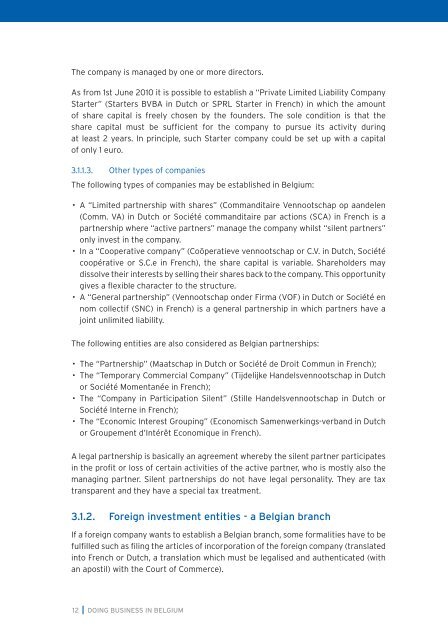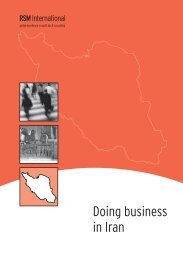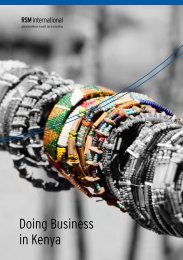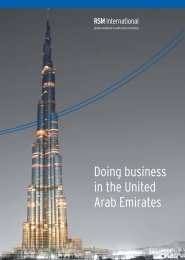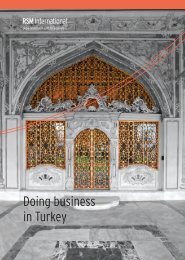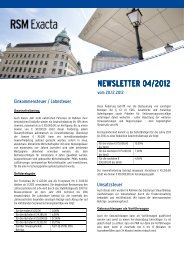Doing Business in Belgium - RSM International
Doing Business in Belgium - RSM International
Doing Business in Belgium - RSM International
You also want an ePaper? Increase the reach of your titles
YUMPU automatically turns print PDFs into web optimized ePapers that Google loves.
The company is managed by one or more directors.<br />
As from 1st June 2010 it is possible to establish a “Private Limited Liability Company<br />
Starter” (Starters BVBA <strong>in</strong> Dutch or SPRL Starter <strong>in</strong> French) <strong>in</strong> which the amount<br />
of share capital is freely chosen by the founders. The sole condition is that the<br />
share capital must be sufficient for the company to pursue its activity dur<strong>in</strong>g<br />
at least 2 years. In pr<strong>in</strong>ciple, such Starter company could be set up with a capital<br />
of only 1 euro.<br />
3.1.1.3. Other types of companies<br />
The follow<strong>in</strong>g types of companies may be established <strong>in</strong> <strong>Belgium</strong>:<br />
• A “Limited partnership with shares” (Commanditaire Vennootschap op aandelen<br />
(Comm. VA) <strong>in</strong> Dutch or Société commanditaire par actions (SCA) <strong>in</strong> French is a<br />
partnership where “active partners” manage the company whilst “silent partners”<br />
only <strong>in</strong>vest <strong>in</strong> the company.<br />
• In a “Cooperative company” (Coöperatieve vennootschap or C.V. <strong>in</strong> Dutch, Société<br />
coopérative or S.C.e <strong>in</strong> French), the share capital is variable. Shareholders may<br />
dissolve their <strong>in</strong>terests by sell<strong>in</strong>g their shares back to the company. This opportunity<br />
gives a flexible character to the structure.<br />
• A “General partnership” (Vennootschap onder Firma (VOF) <strong>in</strong> Dutch or Société en<br />
nom collectif (SNC) <strong>in</strong> French) is a general partnership <strong>in</strong> which partners have a<br />
jo<strong>in</strong>t unlimited liability.<br />
The follow<strong>in</strong>g entities are also considered as Belgian partnerships:<br />
• The “Partnership” (Maatschap <strong>in</strong> Dutch or Société de Droit Commun <strong>in</strong> French);<br />
• The “Temporary Commercial Company” (Tijdelijke Handelsvennootschap <strong>in</strong> Dutch<br />
or Société Momentanée <strong>in</strong> French);<br />
• The “Company <strong>in</strong> Participation Silent” (Stille Handelsvennootschap <strong>in</strong> Dutch or<br />
Société Interne <strong>in</strong> French);<br />
• The “Economic Interest Group<strong>in</strong>g” (Economisch Samenwerk<strong>in</strong>gs-verband <strong>in</strong> Dutch<br />
or Groupement d’Intérêt Economique <strong>in</strong> French).<br />
A legal partnership is basically an agreement whereby the silent partner participates<br />
<strong>in</strong> the profit or loss of certa<strong>in</strong> activities of the active partner, who is mostly also the<br />
manag<strong>in</strong>g partner. Silent partnerships do not have legal personality. They are tax<br />
transparent and they have a special tax treatment.<br />
The Belgian branch is not a legal entity <strong>in</strong> <strong>Belgium</strong> but it constitutes an extension of<br />
the foreign company. This means that all responsibility for any liability <strong>in</strong> <strong>Belgium</strong> (by<br />
means of the Belgian branch) lies with the foreign company.<br />
3.1.3. A jo<strong>in</strong>t venture<br />
A jo<strong>in</strong>t venture can be considered as a cooperation based on an agreement concluded<br />
between two or more companies <strong>in</strong> order to realise a common project. All the legal<br />
implications of such structure have to be determ<strong>in</strong>ed <strong>in</strong> the jo<strong>in</strong>t venture agreement<br />
concluded by the companies concerned. A jo<strong>in</strong>t venture can be established with or<br />
without separate legal personality.<br />
3.1.4. A Trust<br />
The structure of a trust does not exist under Belgian tax law.<br />
However, foreign trusts are <strong>in</strong> pr<strong>in</strong>ciple recognised <strong>in</strong> <strong>Belgium</strong>.<br />
3.2. Audit requirements<br />
The companies which are considered as “small” companies are not obliged to appo<strong>in</strong>t<br />
a statutory auditor. A company is considered to be small if it does not exceed more<br />
than one of the follow<strong>in</strong>g criteria:<br />
• Number of employees (annual average) : 50<br />
• Annual turnover (excl. VAT) : € 7,300,000<br />
• Total of the balance : € 3,650,000<br />
All the other companies are obliged to appo<strong>in</strong>t a statutory auditor. When a<br />
company has more than 100 employees or when the company belongs to a group<br />
which must publish consolidated accounts, it is automatically obliged to appo<strong>in</strong>t<br />
a statutory auditor.<br />
The role of the statutory auditor is the follow<strong>in</strong>g:<br />
• To exam<strong>in</strong>e the accounts and the account<strong>in</strong>g records of the company;<br />
• To prepare a report for the shareholders.<br />
3.1.2. Foreign <strong>in</strong>vestment entities - a Belgian branch<br />
If a foreign company wants to establish a Belgian branch, some formalities have to be<br />
fulfilled such as fil<strong>in</strong>g the articles of <strong>in</strong>corporation of the foreign company (translated<br />
<strong>in</strong>to French or Dutch, a translation which must be legalised and authenticated (with<br />
an apostil) with the Court of Commerce).<br />
12<br />
DOING BUSINESS IN BELGIUM<br />
DOING BUSINESS IN BELGIUM<br />
13


